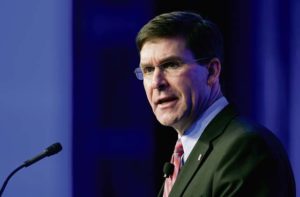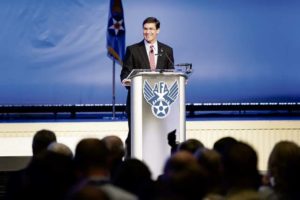by Charles Pope
Secretary of the Air Force Public Affairs

NATIONAL HARBOR, Md. — The emergence of Russia and China along with potential threats in space and from cyber attacks demands that the U.S. military adapt if it is to preserve “our long held advantages,” Defense Secretary Mark T. Esper said Sept. 18 at the Air Force Association’s Air, Space & Cyber conference.
“Succeeding in this new era and winning that competition that is underway requires us to adapt,” Esper said in a 15-minute keynote speech at the Air Force’s largest annual gathering. “The strategic environment has changed, and therefore, we must change as well if we’re to maintain this overmatch we have held for decades.”
The blueprint for success, he said, is the National Defense Strategy, a comprehensive document assembled by former Defense Secretary James Mattis that reshapes the military to address new threats from near-peer competitors while also continuing to prosecute the war on terror and ensuring national security.
“If we are to remain the world’s preeminent military power, then we must change course away from the past and face the challenges of the future head on. … Everything we do must be aimed towards achieving the goals and objectives of (the NDS),” he said. “If something does not, then we should question it in the first place.”
That includes putting a tighter focus on space and moving aggressively to ensuring prowess in multidomain operations, or MDO. That effort calls for seamlessly and simultaneously combining weapons, sensors, data and people from air, space, sea, cyber and information with a speed and clarity that has never been achieved.
Those mandates are not new. In fact, elements of MDO were prominent each day of the three-day conference organized by the AFA that attracts thousands of Air Force active duty, Guard and Reserve Airmen of all ranks as well as industry officials, congressional staffers and retirees.
The day before, for example, Air Force Chief of Staff Gen. David L. Goldfein presented a detailed case for MDO and how the Air Force fits into the equation in an hour-long address.
Esper is confident the goals will be met. Progress has already been made, he said.
There is no choice.
“(While) the United States military was focused on on-going activities in the Middle East, our strategic competitors were actively modernizing their militaries, growing their power and expanding their influence. … China presents an even greater, long-term challenge,” he said.

“What does this all mean for the United States military? Put simply, some of our long held advantages have started to diminish. Great power competition has once again returned to the global stage,” he said.
Like Goldfein the day before, Esper suggested that succeeding in developing MDO, transitioning to the expected creation of the Space Force as a new and separate branch of the military will require cultural change as well as technical advancements.
“The majority of our Airmen sitting in this audience today have spent their entire careers fighting these wars. As a result, our military has become very proficient in low intensity conflict. For decades now, the Air Force has dominated the skies; air superiority has been relatively uncontested,” he said.
Now, “the next big fight may very well begin in space. The United States military must be ready,” he said. “I am confident that we have the strategy needed to win the competition.”
While the multidomain concept appears straightforward, putting it into practice is not. The technical challenges require linking systems to collect vast amounts of data from an array of sensors from the various domains in a way the information can be assessed, understood and transmitted quickly to commanders and combatants to produce correct, coordinated, successful actions.
Every part of the defense establishment is under review to make sure that full power and efficiency is being directed to meeting the goals of the NDS.
New programs and organizations are part of the effort too. The proposed Space Force is the most prominent. And while the form, function and ultimate fate of Space Force is being considered by Congress, Esper said the Department of Defense is moving in other ways to address the needs in space.
“Three weeks ago, I signed documents formally establishing the United States Space Command,” Esper said. “Setting up this unified command … is a critical step in ensuring we can defend our national interests in space. Space Com is now responsible for our daily operations, and running our space systems and ensuring that our space capabilities are integrated into our plans and operations around the world.”
“However, this command alone is not enough to truly posture ourselves for long-term dominance in space. We must take the leap ahead and create an independent Space Force as our newest armed service,” Esper said.
Esper celebrated the Air Force for its history and it’s excellence today. He praised by name “the exceptional leadership team” of Acting Secretary of the Air Force Matthew P. Donovan, and Goldfein, Chief Master Sergeant of the Air Force Kaleth O. Wright. He also said Barbara Barrett, who is nominated to be the next Air Force secretary is “highly qualified.”


